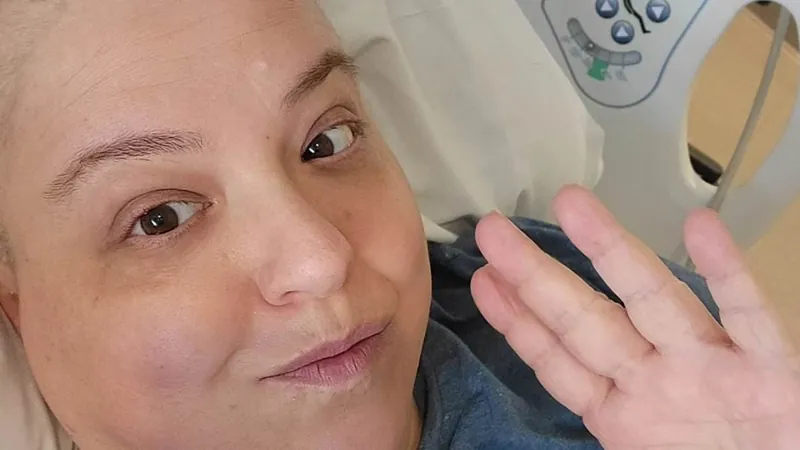
The Heart-Wrenching Silent Treatment: Why Many Cancer Patients Experience 'Ghosting' from Loved Ones
2024-11-17
Author: Ting
Introduction
When Ashley Levinson, a retired nurse from New Jersey, received her stage two breast cancer diagnosis in 2023, she believed her family would rally around her in solidarity. Instead, she faced an excruciating silence from her relatives. Phone calls ceased, texts disappeared, and it felt as if her loved ones were ghosts, vanishing at the moment she needed them most.
The Phenomenon of 'Cancer Ghosting'
Ashley’s experience is far from unique. This phenomenon, often referred to as "cancer ghosting," sheds light on a disturbing trend where friends and family members cut ties with individuals diagnosed with cancer. A striking survey found that 65% of cancer patients reported similar experiences of being largely abandoned after sharing their diagnosis.
Personal Accounts from Healthcare Professionals
Karen Selby, a registered nurse at the Mesothelioma Center in Orlando, shared a poignant account of one of her patients. After his diagnosis eight months prior, he found that nearly all his friends had abruptly stopped communicating with him. "It's a heartbreaking reality," she noted.
The Emotional Toll of Abandonment
The emotional toll of losing relationships during such a challenging time cannot be overstated. Ashley expressed her pain to ABC, saying, "It was really a punch to the gut when I realized my core people weren't there for me." Thankfully, she still enjoyed the unwavering love and support of her two children, Hannah, 21, and Jake, 23.
Reasons Behind Ghosting
But what drives this ghosting behavior? In many cases, it’s not a reflection of the sick person’s character. Rather, friends and relatives may withdraw due to their own fears and traumas, stemming from past experiences with illness or loss. Ashley speculated that her family’s silence might have originated from their traumatic loss of another family member to breast cancer years ago. "Maybe they felt ignoring it would make it go away," she said sadly. "But as we all know, cancer does not go away on its own."
Voices from the Abandoned
Patients have voiced similar sentiments. Natasha Carlson, abandoned by two long-time friends following her 2018 breast cancer diagnosis, recounted her emotional journey in a heartfelt piece. She lamented the lack of communication even when desperately reaching out: "This was one of the most painful parts of the entire cancer experience for me," she stated. The loss of her friends cut deeply, often overshadowing even the physical challenges of her illness.
Maggie Hundshamer-Moshier, another cancer patient, described her fears and the gradual realization of fading friendships. Initially not noticeable, the absence of friends became painfully apparent over time. "It was hard to see outside of my own pain at the time," she reflected. "I never stopped to realize that the people I loved were also just trying to protect themselves."
The Struggle to Support
This common reaction to severe illness raises a perplexing question: Why do loved ones struggle to provide support during such critical times? The answers are often layered. Friends may harbor fears of loss or possess feelings of helplessness. They may refrain from contacting the sick individual out of concern they might say the wrong thing or inadvertently cause more pain by bringing up the illness.
A now-unidentified patient articulated their shock and confusion after being ghosted, sharing that their friend group even collectively ignored their milestone 30th birthday, just months after their diagnosis. The continued pain and anger about this abandonment lingered long after the treatment began.
Karen Selby's Observations
Moreover, Karen Selby emphasized the prevalence of this issue, surprising even herself as she heard about it for the first time from her patients. "This isn’t just a figment of someone’s imagination. It’s a real experience affecting cancer patients across the nation, at a time when they desperately require emotional support."
The Importance of Support
Understanding the reasons behind ghosting can mitigate some of the hurt for patients. However, the emotional scars left behind are deep, reminding us that, in times of illness, love and support from family and friends can have healing powers that go beyond medical treatment. The story of Ashley, Natasha, and others serves as an urgent call to action: for families to confront their fears, communicate openly, and provide the essential love and support that those battling cancer desperately need.


 Brasil (PT)
Brasil (PT)
 Canada (EN)
Canada (EN)
 Chile (ES)
Chile (ES)
 España (ES)
España (ES)
 France (FR)
France (FR)
 Hong Kong (EN)
Hong Kong (EN)
 Italia (IT)
Italia (IT)
 日本 (JA)
日本 (JA)
 Magyarország (HU)
Magyarország (HU)
 Norge (NO)
Norge (NO)
 Polska (PL)
Polska (PL)
 Schweiz (DE)
Schweiz (DE)
 Singapore (EN)
Singapore (EN)
 Sverige (SV)
Sverige (SV)
 Suomi (FI)
Suomi (FI)
 Türkiye (TR)
Türkiye (TR)